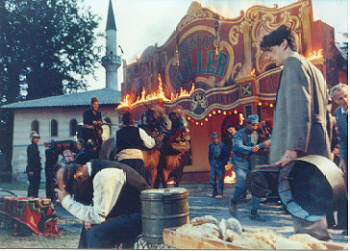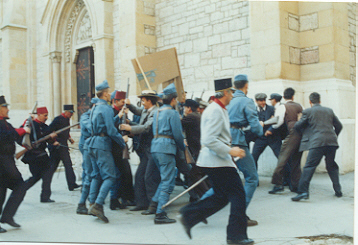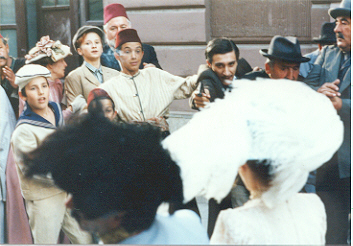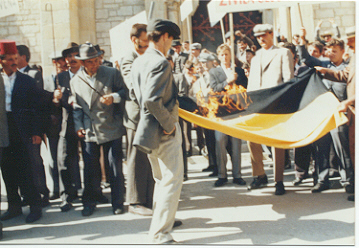Short summary
 “Belle Epoque” is the story about the
last days of Austro-Hungarian rule in the Balkans.
It is the story of the events leading up to the assassination of the
Austro-Hungarian Archduke Ferdinand, which sparked World War I.
The months before the assassination were a time of unrest and intrigue, a
tense time of false peace and false stability.
“Belle Epoque” is the story about the
last days of Austro-Hungarian rule in the Balkans.
It is the story of the events leading up to the assassination of the
Austro-Hungarian Archduke Ferdinand, which sparked World War I.
The months before the assassination were a time of unrest and intrigue, a
tense time of false peace and false stability.
The main hero is Anton Walits, a
cameraman who happens to be filming various events around Bosnia in the days
preceding the assassination. Anton
is part of the Austro-Hungarian capitalist class.
Born in Bosnia, but of mixed European
origins, he studied film in Vienna and has now returned to Bosnia, only to
naively get involved in the dramatic political plots leading up to the war.
 The revolutionary characters with
whom Anton gets involved include a merry cabaret entertainer who is linked with
international spy activity, Swiss-run and pro-socialist Bacuny-type anarchists,
and the young Balkan assassins from the organization of “Mlada Bosna.”
Walits is in close contact with these revolutionary-types, and without
even realizing it he becomes a collaborator in the insurgent events.
The revolutionary characters with
whom Anton gets involved include a merry cabaret entertainer who is linked with
international spy activity, Swiss-run and pro-socialist Bacuny-type anarchists,
and the young Balkan assassins from the organization of “Mlada Bosna.”
Walits is in close contact with these revolutionary-types, and without
even realizing it he becomes a collaborator in the insurgent events.
 A third of the film takes place in Vienna,
where Walits learned to be a filmmaker, projectionist and cameraman.
Many important historical figures are mentioned at this point in the film
in order to capture the atmosphere of the era.
Freud, young Hitler, Count Alexander Sascha Kolowrat (the pioneer of
Austrian film-making), German
cameraman Karl Freund, a boy named Fred Zinnemann (later a famous Hollywood
director) and others are subtly portrayed as satirical and vaudeville
characters.
A third of the film takes place in Vienna,
where Walits learned to be a filmmaker, projectionist and cameraman.
Many important historical figures are mentioned at this point in the film
in order to capture the atmosphere of the era.
Freud, young Hitler, Count Alexander Sascha Kolowrat (the pioneer of
Austrian film-making), German
cameraman Karl Freund, a boy named Fred Zinnemann (later a famous Hollywood
director) and others are subtly portrayed as satirical and vaudeville
characters.
 Belle Epoque” contains both irony and
melodrama. It marks the end of the epoch of Gutenbergh’s world of the first
published book and marks the beginning of the modern era of film, satellite and
technology. Walits’ films both
document the volatile times and represent the beginning of the era of modern
television and media. The point of
“Belle Epoque” is to present modern audiences with an interesting portrait
of the exciting and frightening way in which this century began.
And perhaps to ask ourselves whether the end of the 20th
century looks like the reverse picture of its beginning?
Belle Epoque” contains both irony and
melodrama. It marks the end of the epoch of Gutenbergh’s world of the first
published book and marks the beginning of the modern era of film, satellite and
technology. Walits’ films both
document the volatile times and represent the beginning of the era of modern
television and media. The point of
“Belle Epoque” is to present modern audiences with an interesting portrait
of the exciting and frightening way in which this century began.
And perhaps to ask ourselves whether the end of the 20th
century looks like the reverse picture of its beginning?
